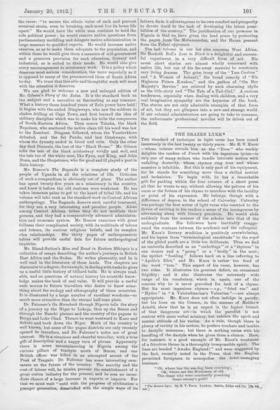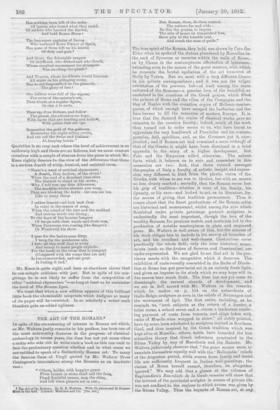THE BRAZEN LYRE.* THE standard of technique in light verse
has been raised immensely in the last twenty or thirty years. Mr. E. V. Knox —whose volume reveals him as the "Evoe " who weekly delights the readers of Punch with his ingenious lyrics—is only one of many writers who handle intricate metres with unfailing dexterity, whose rhymes ring true and whose scansion is infallible. But this is only part of his equipment, for he stands 'for something more than a skilled metrist and technician. To begin with, he has a remarkable gift for packing within the four corners of a short poem all that he wants to say, without allowing the pattern of his verse or the fetters of his rhyme to interfere with the lucidity or point of his expression. He belongs, though with a difference of degree, to the school of Calverley. :Calverley was perhaps the first writer of light verse who resorted to the device of exciting in his readers a sense of the incongruous by alternating slang with literary precision. Ile would slide suddenly from the manner of the scholar into that of the undergraduate. His followers have inevitably exagge- rated the contrast between the academic and the colloquial. Mr. Knox's literary erudition is positively overwhelming, and his lapses from "terminological exactitude" to the argot of the gilded youth are a little too deliberate. Thus we find an umbrella described as an "ombrifuge " or a " thyrsus" in one stanza and a " gamp " or a " brolly " in the next ; the epithet " footling " follows bard on a line referring to
"Apollo's fillet," and Mr. Knox is rather too fond of the word "turn." This aspect of his verse, however, has two sides. It illustrates his greatest defect, an occasional frigidity; and it also illustrates the extremely wide range of his vocabulary, which is, again, one of the reasons why be is never gravelled for lack of a rhyme.
But his most ingenious rhymes — e.g., " fried roe " and " Hydro " in " A Valetudinarian's Valentine "—are always appropriate.- Mr. Knox does not often indulge in parody, but his lines on the Censor, in the manner of Matthew Arnold, show that lie is an expert in the higher branch of that dangerous art—in which the parodist is not content with mere verbal mimicry, but catches the spirit and mental attitude of his victim. As a rule, though there is plenty of variety in his metres, be prefers trochaic and iambic to dactylic measures; but there is nothing amiss with his handling of the dactyls when he gives them a chance. Here, for instance, is a good example of Mr. Knox's treatment of a frivolous theme in a thoroughly irresponsible spirit. The lines are headed " Awake, England!" and were suggested by the fact, recently noted in the Press, that the English permitted foreigners to monopolize the hotel-managing business:
" Oh, where has the sea-dog been couching; Oh, Where are the Norsemen of old, The chaps who wore constantly pouching Some enemy's gold?
• The Brawn byre. By E. V. Knox. London : Smith, Elder and Co. 13s. 6d. I net.]
Has nothing boon left of the order Of herons who boned what they could, Of raiders who harried the Border, And bold Ronin noon The buccaneer captains of Devon Who barbered Kine PHILIP of Spain, Has none of them left us his leaven Of duty and gain F And those, the delectable rangers
Of childhood, who dirked and. who drank, Whose simplest amusement for strangers Was strolling the plank P And TURPIN, whose hoof-beats would hammer All night on his pillaging route; Has he notbequeathed us the glamour, .,The glory of loot ?
Our fathers were full of the vigour, The verve of the caterer's art, That bleeds at a regular figure, Or else a /a carte.
Then up, 0 ye Britons, and follow The gleam, the adventurous hope, With bucks that are bending,and With palms that are opo.
Remember the-gold of the galleons, Remember the night-riding swells, And cut out the Swiss and Italians At keeping hotels."
Quotation is no easy task where the level of achievement is so uniformly high and there are no failures, but we must content ourselves with a couple of stanzas from the piece in which Mr. Knox rightly demurs to the view of the Athenwunt that there is a serious dearth of witty, ironical, and satirical verse.
" There's a want of satirical rhymesters, A dearth, they declare, of the clown ! When the soul of a decadent timo stirs The staidest to stand on his crown; " Why, I tell yon, my dear Athettreum,
The.bardlets whose absence you weep, Thoy.,are blocking tho kerbs : one can see 'em Like so many sheep.
I rather lament and look back (but In vain) to the season of song,
When the sound of the lute and the sackbut And serious music was strong; To the days of 'the leonine bangers Of 'harps with their wrath and their woe, When Parnassus was roaring like Sanger's Or Wonib.well his show.
I pine for the lachrymose ditty, I weep for the ponderous ode, I hate ,all.this stuff that is witty And meant to make people explode:
For the trade in the verse that is pungent
(Compared with the songs that are sad) Is too overcrowded, and one gent Is feeling it bad."
. Mr. Knox is quite right, and here as elsewhere shows that be can mingle criticism with jest. But in spite of his mis- givings he is not likely to suffer from the competition of other " satirical rhymesters "—so long at least as he maintains the level. of The•Brazen Lyre.
We trust that when a new edition appears of this brilliant little book the abominable misprints which disfigure so many of its pages will be corrected. In so scholarly a writer such
blunders gain an added ugliness.











































 Previous page
Previous page